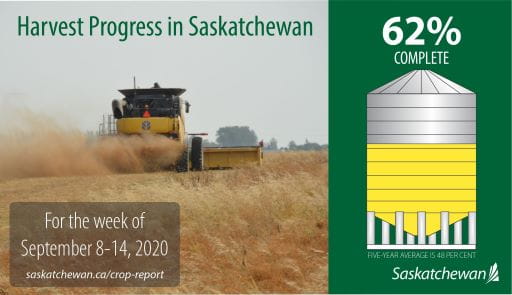Released on September 17, 2020
Farmers made significant harvest progress again this week. Sixty-two per cent of the crop has been combined, up from 43 per cent last week and well ahead of the five-year (2015-2019) average of 48 per cent. An additional 27 per cent of the crop is swathed or ready to straight-cut. Warm and dry weather is needed to continue drying down crops.
Harvest is most advanced in the southwest region, where 90 per cent of the crop is in the bin. The southeast has 77 per cent combined, the west-central 61 per cent, the east-central 51 per cent, the northeast 33 per cent and the northwest 18 per cent.
Ninety-seven per cent of lentils, 94 per cent of field peas, 87 per cent of mustard, 72 per cent of barley, 86 per cent of durum, 69 per cent of chickpeas, 55 per cent of spring wheat, 42 per cent of canola and 28 per cent of flax has now been combined. An additional 47 per cent of canola is swathed or ready to straight-cut.

Durum grades are estimated as 55 per cent 1 CW, 33 per cent 2 CW, nine per cent 3 CW and three per cent 4 CW and 5 CW. Pea grades are estimated as 38 per cent 1 CAN, 56 per cent 2 CAN and six per cent 3 CAN. Lentil grades are estimated to be 35 per cent 1 CAN, 58 per cent 2 CAN, six per cent 3 CAN and one per cent sample grade.
Most of the province received very little rainfall this week. The Nipawin area received the highest amount of rain with 25 mm. Topsoil moisture conditions in the province continue to deteriorate due to strong winds and minimal rainfall. Cropland topsoil moisture is rated as 30 per cent adequate, 41 per cent short and 29 per cent very short. Hay and pasture land topsoil moisture is rated as 26 per cent adequate, 33 per cent short and 41 per cent very short.
The majority of crop damage this week was due to frost, wind and dry conditions. Damage from frost varied depending on the temperature and stage of the crop, with later seeded and less mature crops impacted the most. Wind continued to blow swaths and shell out crops. There were also reports of damage caused by wildlife, waterfowl and ergot in durum crops.
Farmers are busy combining, swathing, hauling bales and moving cattle.
With harvest underway in Saskatchewan, we want to remind producers to exercise caution and remain safe.
A complete, printable version of the Crop Report is available online at https://www.saskatchewan.ca/crop-report.
Follow the 2020 Crop Report on Twitter at @SKAgriculture.
-30-
For more information, contact:
Sara Tetland
Agriculture
Moose Jaw
Phone: 306-631-0483
Email: sara.tetland@gov.sk.ca

